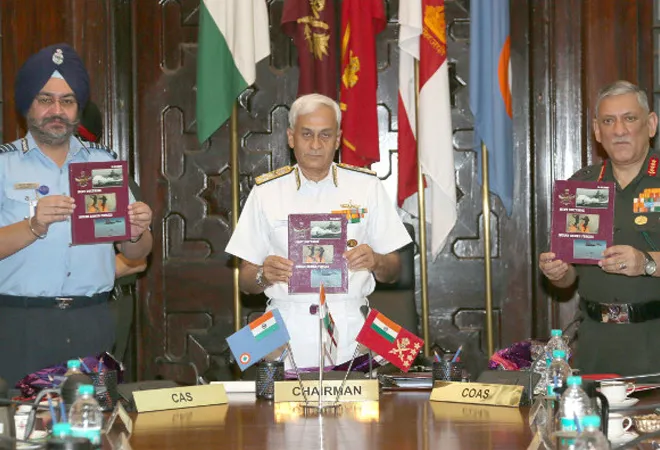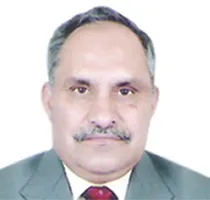Traditionally, the Army believed that Second Lieutenants were to be seen and not heard, and I suppose that was true for the other services as well. Unfortunately, it appears that this was also expected of our military hierarchy, including the Service Chiefs, as well. Over the years the military became the original “Ghoongi Guriya” as Generals kept their own counsel, only to be occasionally paraded in front of the media to parrot the Governments views regardless of what their own professional assessments on the subject may have been.
Therefore, it should come as no surprise that in 1992, the then Army Chief, General Rodrigues, faced the ignominy of having to apologize to parliament in writing for having apparently spoken out of turn and suggesting that “Good governance is not the job of the army alone.” Off course, he had also alluded to “bandicoots” as well, a term some members may well have taken to heart, which probably provoked the outcry that it did. With Kashmir and the North East in the midst of an insurgency and Punjab still recovering from one, his statement was actually a very mild rebuke of those responsible for the wretched state of affairs we found ourselves in.
But as country singer and Nobel Laureate Bob Dylan so aptly put it years ago, ‘the times they are a-changing’. And so it is that in these times senior serving officers have increasingly become more vocal and are less hesitant of speaking up in public forums to air their frank views on issues impacting the military. Indeed while the present Army Chief has been the most vocal, the Air Chief too has spoken up as well, as also have a couple of Army Commanders. Expectedly, politicians, intellectuals and media commentators, including a few former military veterans have been outraged at this turn of events.
In November last year, for example, during a visit to Kodagu, General Bipin Rawat publicly stated that Field Marshal Cariappa, India’s first Post- Independence Commander-in-Chief, responsible for setting the Army on the course it is today, deserved to be awarded the Bharat Ratna. Noted historian Ramachandra Guha, who loses no opportunity to hold forth, immediately took umbrage at the suggestion, and went on to castigate the Army Chief for speaking too much. His reasons were two-fold, firstly that the Chief “had no business publicly recommending one of his predecessors” and that to just months before an election to the State Assembly. Secondly, that the Field Marshal’s “singular distinction” was that he was India’s first Army Chief, not necessarily its best.
He also went on to remind us of the friendship that existed between his family and that of the Field Marshal’s over four generations, though I am not quite sure what that had to do with anything or what the current generation of Cariappas’ think of “friends” like him, more so, since his criticisms lack substance. For one, if a politician can recommend another for the award so can anybody else and why not the Chief? Secondly, the award is not a race that only one can win and, as a matter of fact, both the other names mentioned by him, General Thimayya and Marshal of the Air Force Arjan Singh, as well as Field Marshal Manekshaw, who truly won us our first real victory in a very long time in 1971, are all equally deserving, certainly more so than some of the others on that list of forty five awardees till date. After all if their services were not of an exceptional order who’s was? But what is worse is that Mr. Guha attempted to politicize the speech by linking it to the elections that are to be held in May this year, a full seven months later. This attempted linkage was not only absurd, but mischievous as well.
But he is not the only one to do so. Mr. Mani Shankar Aiyar in a recent opinion piece criticized the Army and Air Force Chief’s for speaking out of turn on issues in the realm of politics. He further went on to claim that because of this there were doubts about the military continuing to remain apolitical and the disastrous implications that would have for our democracy and our democratic institutions. Coming from someone whose foot in mouth antics have contributed in no small measure to his party’s discomfiture and even electoral loss on more than one occasion, this was indeed a case of the kettle calling the pot black. Moreover, his talk of democracy being in danger is indeed amusing given that his own loyalty and extreme subservience is to the feudal leadership of a party that is hardly an exemplar of democratic functioning.
That apart, his criticism of the Army Chief was on the basis of media reports, which, if he had taken the trouble to actually listen to the Chief’s speech on You Tube, clearly quoted him out of context. More importantly, while the foundation of our national identity may be based on “the belief that irrespective of communities and creeds, citizens of the country sustain the spirit of national sovereignty”, to suggest that the demographic changes that have occurred, and continue to occur, because of illegal immigration from Bangladesh pose no security threat is utter poppycock. The recent attack on the Sanjuwan Army Camp in Jammu, where the needle of suspicion points towards Rohingyas, illegally settled on the periphery of the camp, providing logistical support to the terrorists is a case in point.
To suggest that the Chief should not bring up his concerns to the public at large only detracts from the manner in which democracies should ideally function, unless off course he believes his own party has something to hide. Similarly, there is absolutely nothing wrong with the Air Chief clearing the air about the cost of the Rafale aircraft and its capabilities, especially since its purchase has led to some controversy. He would hardly want a repetition of what followed the Bofors scandal. Because of its subsequent political fallout, future procurement of artillery weapons systems was frozen and we continue to depend on obsolete weapons to meet our needs.
Given the general lack of awareness of matters pertaining to the military, most people seem to be unaware that our Services owe their allegiance to the Constitution and not to any party or Government. Moreover, regardless of some misconceptions that may exist, it is the one institution that has been truly secular in its outlook and actions and has spilt more blood defending our unity and integrity than all the rest put together. There is also no gainsaying the fact that all of our troubles can clearly be blamed on the shenanigans of the political class, ably supported by a corrupt and willing bureaucracy, that has made the tactics of divide and rule into a fine art.
Unfortunately by adopting a vow of silence, no less effective than the Mafia’s Omertà, the Military has been isolated from the people. While this may have helped in shielding the military from regressive forces, it has also given the politico-bureaucrat nexus the opportunity to heap insults and indignities on the military in full measure with no blow back. They have also simultaneously ensured that military has role to play in the formulation of national security policies other than to carry out orders that they are given. What can be more humiliating or illogical than having the Defence Secretary, who stands lower in precedence to the Service Chiefs and is clearly ignorant of matters military, being given the responsibility for the defence of the Nation?
It is no wonder then that the Army finds itself lumped with 68% obsolete equipment and no funds to modernize, as the Vice Chief of Army Staff just stated before the Parliamentary Sub- Committee on Defence. It is a matter of shame that this Government, and the ones before it, while blithely ignoring defence modernization, have nonchalantly gone about using the military to fulfill their own nefarious designs that would help them to continue remaining in power. The disinterest among successive governments to solve long-standing issues in the North East, Jammu and Kashmir and with the Maoists through concerted political dialogue and action, despite grevious losses to our Security and Police Forces, is another clear pointer to this fact.
If our country and our military are to be saved from the depredations of our politicians, there is little doubt that senior leaders within the military will have to speak up directly to the people, just as the senior most judges of the Supreme Court were recently forced to do. That is the only way that we can nurture and strengthen the roots of our nascent democracy. The Second Lieutenants’ rank has been dispensed with and thus what was expected of them has faded into oblivion, so too must the reluctance of senior commanders to speak up on professional issues. As for those who oppose such interventions, it’s time to wake up and smell the good Kodagu coffee.
This commentary originally appeared in Times of India
The views expressed above belong to the author(s). ORF research and analyses now available on Telegram! Click here to access our curated content — blogs, longforms and interviews.




 PREV
PREV


